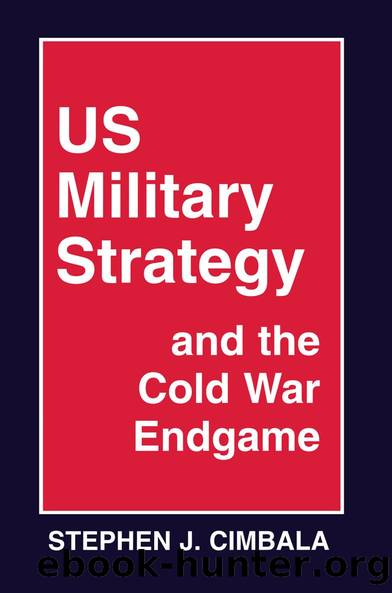US Military Strategy and the Cold War Endgame by Stephen J. Cimbala

Author:Stephen J. Cimbala [Cimbala, Stephen J.]
Language: eng
Format: epub
Tags: History, Military, General, Political Science, Security (National & International)
ISBN: 9781135202378
Google: t0maAgAAQBAJ
Publisher: Routledge
Published: 2014-01-14T16:01:49+00:00
4
European Security after the Cold War
Entering into the post-Cold War world, policy-makers in Europe and in North America find that the uncertainties of freedom have replaced the certainty of stable pacification. Leaders now can choose, and, therefore, they can choose badly. Three issues make clear the importance of logical strategic choice in post-Cold War Europe: the potential re-establishment of a multipolar power system in Europe; the dilemmas of denuclearization and greater dependency on conventional deterrence for crisis management and war avoidance; and, the potential development of truly defensive military doctrines and force postures from the Atlantic to the Urals.
In this chapter the implications of Europeâs repolarization for its leading state and non-state actors in security matters are considered. A return to the multipolarity of the years immediately preceding the Second World War is improbable: Europeâs security problématique has changed too much and possible responses are too different to expect that future security dilemmas will be clones of those which plagued Europe between the world wars. Second, the implications of projected US military strategy for European and global security are discussed, emphasizing its implications for the future of deterrence. Future US strategy will be more dependent upon conventional deterrence to cover the entire conflict spectrum. While this makes future Desert Storms potentially manageable and lesser conventional contingency operations feasible, the nuclear and low-intensity conflict ends of the spectrum may create off-line strategic perturbations. Third, two ideal-typical constructs are developed to discuss the relationship between Europeâs perceived security dilemmas and the reliance by states upon offensive or defensive military postures for deterrence and defense. Application of these ideal types to historical experience and to future prospects for the European security community supports guarded optimism about the credibility of non-offensive defense in Europe, notwithstanding uncertainty about the future of Russia and its armed forces.
Download
This site does not store any files on its server. We only index and link to content provided by other sites. Please contact the content providers to delete copyright contents if any and email us, we'll remove relevant links or contents immediately.
Spell It Out by David Crystal(35856)
Life for Me Ain't Been No Crystal Stair by Susan Sheehan(35543)
Cecilia; Or, Memoirs of an Heiress — Volume 1 by Fanny Burney(32078)
Cecilia; Or, Memoirs of an Heiress — Volume 3 by Fanny Burney(31470)
Cecilia; Or, Memoirs of an Heiress — Volume 2 by Fanny Burney(31420)
The Great Music City by Andrea Baker(30797)
Professional Troublemaker by Luvvie Ajayi Jones(29426)
We're Going to Need More Wine by Gabrielle Union(18645)
Twilight of the Idols With the Antichrist and Ecce Homo by Friedrich Nietzsche(18309)
The Secret History by Donna Tartt(18223)
All the Missing Girls by Megan Miranda(14798)
Cat's cradle by Kurt Vonnegut(14782)
Pimp by Iceberg Slim(13803)
Bombshells: Glamour Girls of a Lifetime by Sullivan Steve(13701)
Fifty Shades Freed by E L James(12927)
Talking to Strangers by Malcolm Gladwell(12891)
Norse Mythology by Gaiman Neil(12862)
The Social Justice Warrior Handbook by Lisa De Pasquale(11961)
Underground: A Human History of the Worlds Beneath Our Feet by Will Hunt(11846)
